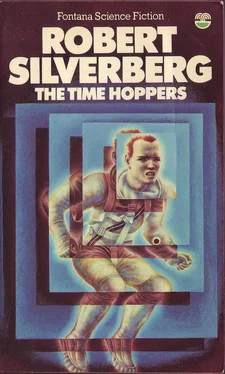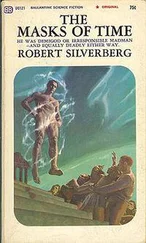Kaspar Hauser: staggered into the town of Nuremberg, Germany, on an afternoon in May 1828. Apparently sixteen or seventeen years old. (A trifle young for becoming a hopper, Quellen thought. Perhaps deceptive in appearance.) Capable of speaking only two sentences in German. Given a pencil and paper, he wrote a name: “Kaspar Hauser’. Assumption made that that was his name. He was unacquainted with the commonest objects and experiences of everyday affairs of human beings. Dropped down out of a time fault, no doubt. A quick learner, though. Detained for a while in prison as a vagrant, then turned over to a schoolmaster, Professor Daumer. Mastered German and wrote an autobiographical essay, declaring that he had lived all his life in a small, dark cell, living on bread and water. Yet a policeman who had found him declared, “He had a very healthy colour: he did not appear pale or delicate, like one who had been some time in confinement.”
Many contradictions. Universal fascination in Europe; everyone speculating on the mysterious origin of Kaspar Hauser. Some said he was the crown prince of Baden, kidnapped in 1812 by the agents of the morganatic wife of his postulated father, the grand duke. Denied. Subsequently disproves Others said he was sleepwalker, amnesiac. 17 October 1829: Kaspar Hauser found with a wound in forehead, allegedly inflicted by a man in a black mask. Policemen assigned to guard him. Several further purported assaults. 14 December 1833: Kaspar Hauser found dying in a park, with deep stab wound on his left breast. Claimed that a stranger had inflicted the wound. No sign of weapon in the park, no footprints in vicinity except Hauser’s own. Suggestion that the wound was self-inflicted. Died several days afterwards after exclaiming, “My God! that I should so die in shame and disgrace!”
Quellen disconnected the spool. Pigs, dogs, the Princess Caraboo, Kaspar Hauser-it was all quite entertaining. It might even support a belief that the whole of human history was besprinkled with time-travellers, and not simply the period from 1979 to 2106. Fine. But such facts did little to solve Quellen’s immediate problems, however much the gathering of them had gratified the beefy Brogg’s taste for scholarship. Quellen put the spool away.
He dialled Judith’s number. Her face appeared on the screen, pale, sombre, austere. She fell short of being beautiful by quite a good deal. The bridge of her nose was too high, her forehead was somewhat domed, her lips were thin, her chin was long. Her eyes were disquietingly far apart, with the right one slightly higher than the left. Yet she was not unattractive. Quellen had toyed with the temptation of allowing himself to fall in love with her. It was awkward, though; he could not let her get too far within his emotional defences without telling her about the place in Africa, and he did not want to share that fact with her. She had a streak of righteousness; she might inform on him.
She said, “Have you been hiding from me, Joe?”
“I’ve been busy. Submerged in work. I’m sorry, Judith.”
“Don’t let your guilts overflow. I’ve been getting along quite well.”
“I’m sure you have. How’s your frood?”
“Dr Galuber? He’s fine. He’d like to have the chance to meet you, Joe.”
Quellen bristled. “I’ve got no plans for entering therapy, Judith. I’m sorry.”
“That’s the second time you’ve said you were sorry in the last three sentences.”
“I’m sor—” Quellen began, and then they both laughed. Judith said, “I meant for you to meet Dr Galuber socially. He’ll be at our next communion.”
“Which is?”
“Tonight, as a matter of fact. Will you come?”
“You know that social regurgitation has never delighted me very much, Judith.”
She smiled in a wintry way. “I know that. But it’s time you got out of your shell a little. You live too much to yourself, Joe. If you want to be a bachelor, that’s your business, but you don’t have to be a hermit too.”
“I can put a piece in the slot of a frood machine and get advice just as profound as that.”
“Maybe so. Will you come to the communion, though?” Quellen thought of the case he had studied only an hour or so back, of the earnest communicant who had slipped pseudoliving glass into the alimentary canals of his fellow worshippers and then had watched them die in agony. He pictured himself writhing in torment while a weeping Judith clung to him and tried to extract the last vestige of emphatic sorrow from his sufferings, after the manner of her cult.
He sighed. She was right: he had been living too much to himself these days. He needed to get out, away from his official responsibilities.
“Yes,” he said. “Yes, Judith, I’ll come to the communion. Are you happy?”
Stanley Brogg had had a busy day.
The UnderSec was juggling a lot of Quellen’s hot potatoes at once, but it did not trouble him, for Brogg had a good capacity for work. He privately felt that he and Spanner between them kept the whole department going. They were two of a kind, both big men, massive and methodical, with a reserve of flesh to draw extra energy from in times of crisis. Of course, Spanner was in the administrative end, and Brogg a lowly legworker. Spanner was Class Six, Brogg Class Nine. Yet Brogg saw himself as Spanner’s comrade-in-arms.
Those other two, Koll and Quellen—they were excrescences on the department. Koll was full of hatred and mischief, seething with wrath simply because he was small and ugly. He had ability, of course, but his basically neurotic orientation made him dangerous and useless. If ever there was a case for compulsory frooding, it was Koll. Brogg often compared him to Tiberius Caesar: a baleful man full of menace, not insane but badly askew and so to be avoided.
If Koll were Tiberius, Quellen was Claudius; amiable, intelligent, weak to the core. Brogg despised his immediate superior. Quellen struck him as a ditherer, unfit for his post. Now and then Quellen could act with vigour and determination, but it didn’t come naturally to him. Brogg had been doing the legwork for Quellen for years; otherwise, the department would long since have fallen apart.
A surprising thing about Quellen, though: he was capable of criminality. That had startled Brogg. He didn’t think the man had it in him. To obtain a plot of land in Africa by diligently falsifying records, to apply and receive illegal stat service from a Class Seven apartment to the Congo, to live a secret life of ease and even luxury—why, it was an achievement so monstrously bold that Brogg still couldn’t see how Quellen had carried it off. Unless the explanation was that Quellen was so repelled by the harshness of life all about him that he was willing to take any risk to escape from it. Even a coward could rise to what looked like moral grandeur in the interests of his own cowardice. In the same way, a soft, flabby man like the Emperor Nero could transform himself into a demon simply to preserve his own flabbiness. Nero, thought Brogg, hadn’t been innately demonic after the fashion of Caligula; he had drifted into monstrosity in easy stages. In a way it was out of character for him, just as Quellen’s surprising act of boldness jarred with the image of the man that Brogg had constructed.
Brogg had found out Quellen’s great secret purely by accident, though there was some degree of treachery mixed into it. He had suspected for quite a while that Quellen was up to something peculiar, but he had no idea what it was. Deviant religious activity, perhaps; maybe Quellen belonged to one of the proscribed cults, a chaos group perhaps, or one of the rumoured bands that gathered in dark corners to pray to the vicious pyrotic assassin, Flaming Bess.
Not knowing the details, but sensing the defensive wariness in Quellen’s recent behaviour, Brogg sought to turn the situation to his personal profit. He had high expenses. Brogg was a man with pretensions to scholarship; immersed as he was in the study of the ancient Romans, he had surrounded himself with books, authentic Roman coins, scraps of history. It took money to buy anything authentic. Brogg was living to the hilt of his salary now. It had struck him that Quellen might be a fruitful victim for extortion.
Читать дальше












